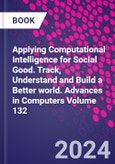Applying Computational Intelligence for Social Good: Track, Understand and Build a Better World, Volume 132 presents views on how Computational Intelligent and ICT technologies can be applied to ease or solve social problems by sharing examples of research results from studies of social anxiety, environmental issues, mobility of the disabled, and problems in social safety. Sample chapters in this release include Why is implementing Computational Intelligence for social good so challenging? Principles and its Application, Smart crisis management system for road accidents using Geo-Spacial Machine Learning Techniques, Residential Energy Management System (REMS) Using Machine Learning, Text-Based Personality Prediction using XLNet, and much more.
Please Note: This is an On Demand product, delivery may take up to 11 working days after payment has been received.
Table of Contents
1. Why is implementing Computational Intelligence for social good so challenging? Principles and its Application
Preetha Evangeline and Anandhakumar P
2. Smart crisis management system for road accidents using Geo-Spacial Machine Learning Techniques
Cephas Paul Edward
3. Residential Energy Management System (REMS) Using Machine Learning
G Ramya and R Ramaprabha
4. Text-Based Personality Prediction using XLNet
Ashok Kumar Jayaraman and Gayathri Ananthakrishnan
5. Articulating the power of reasoning and gathering data for Information security and Justice
Preetha Evangeline and Anandhakumar P
6. Blockchain Smart Contracts Quality Measurement using Bayesian Networks
Lakshminarayana Kodavali I and K. Sathiyamurthy
7. Short-Term Wind Power Prediction Using Deep Learning Approaches
Anandhakumar P and Alex Luke K.A
8. Cyber Data Trend and Intelligent Computing
Atma Sahu and Preetha Evangeline
9. Demystifying the Edge Intelligence
Pethuru Raj Chelliah Sr. and Preetha Evangeline
10. An Automatic Path Navigation for Visually Challenged People using Deep Q Learning
Muthurajkumar S
11. Delineating Computational Intelligence during Epidemic Emergencies and Outbreaks
Preetha Evangeline and V. Vivek
12. Deep Learning Model for Computation, Calibration and Estimation of Biotic Stress in Crops
Preetha Evangeline and Anandhakumar P
13. Weather Nowcasting Model: A Rough Set Approach
S. Anbarasu and Anandhakumar P
14. Intelligent methodologies for Assessment of Plant exracts as protectants against storage pests
Gowthamy U. and Hemalatha G.
15. Automatic programming (source code generator) based on an ontological model
Preetha Evangeline and Rex Vinod. A








